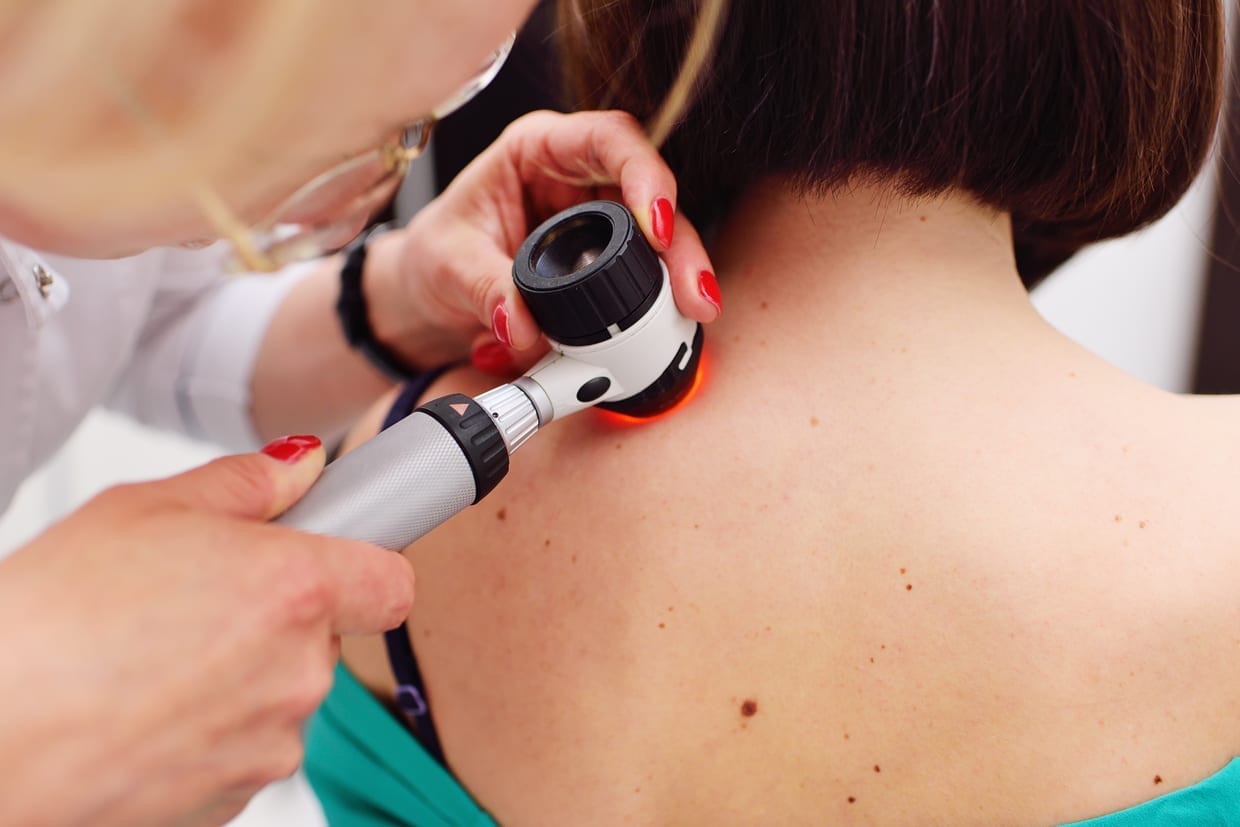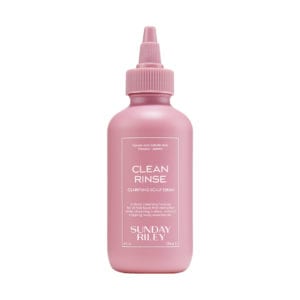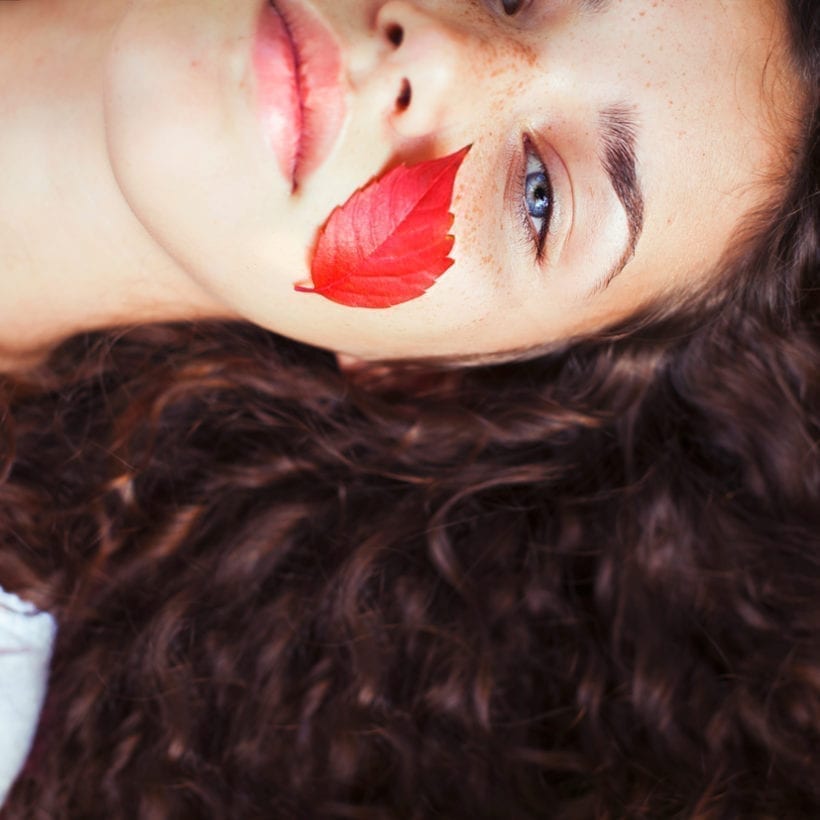It is October and I am ready for the chunky, loose sweaters (smocks, as I have started to call them), dark nails and a candle in every room. Do you know what is apparently not so ready for the changing seasons? My skin. I spoke with three dermatologists and an aesthetician about common autumn skin woes, and how to fix them.
Dry Skin and Lips
Skin and lips get dry in the fall, which is something you have likely already noticed in yourself, but that does not make it any less annoying. Rachel Nazarian M.D., of Schweiger Dermatology Group in New York City, says as soon as fall hits, she sees a major rise in clients who are experiencing dry, itchy skin. And as good as a hot shower feels on a cold day, the high heat is not good for the skin.
As good as a hot shower feels on a cold day, the high heat is not
good for skin.
Nazarian says one of the easiest ways to improve dry skin is to change your cleansing regimen. “Long, hot showers with lots of scented soap is a sure way to dry out the skin and strip natural oils from the surface. Instead, use gentle unscented cleansers [that are] free of sulfates. Right upon leaving the shower, lock in the moisturizer by applying a good emollient cream. This prevents moisture loss and decreases the evaporation of moisture from the skin,” she says. She recommends investing in a moisturizer that contains ceramides.
For dry skin and lips, you can also look for products that contain humectants, which include ingredients like honey, aloe vera, egg white, and seaweed, that actually pull new moisture into the skin, unlike occlusives that trap existing moisture. Occlusives (lanolin, certain oils, and shea butter for example) and humectants are a moisturizing dream team when paired together.
I used to think that acids for skin sounded scary, or at the very least drying, but they have actually opened up my world to skin that is more hydrated than ever. “Consider hydration with hyaluronic acid,” says Denise Judson, a medical aesthetician at Adult & Pediatric Dermatology, PC in Concord, Massachusetts. “Hyaluronic acid has many benefits, but [it is best] known for its anti-aging and hydrating benefits without the harsh effects. This is because the ingredient’s main function is to retain water to keep your skin moist.”
Residual Damage From Summer
Summer is good for the soul, but possibly not so great for your skin. Coming off of three months of near-constant rosé and sun-soaked days (no regrets, well okay, very few) my skin could use a little help. You may notice after the summer months your skin has a duller, more uneven texture, additional freckles, discoloration, or melasma.
Ranella Hirsch, M.D., a board-certified dermatologist, says there are many treatment options available to combat skin that has been hit hard by summer. “Many therapies are available at your dermatologist’s office to treat sun damage; they run the gamut for downtime and cost,” she says. “From something very much home-based — like prescription topicals — to peels, micro-needling, and light-based devices, your best bet is to have a conversation where you share your specific goals and budget.”

Mona Sadeghpour, M.D., FAAD, a board-certified dermatologist, adds, “Fall is a good time to check in with a board-certified dermatologist to ensure your skin has not sustained excessive damage during the outdoorsy summer months. It’s common for sunspots to get darker and for new freckles to have appeared during the summer months. To help protect your skin from skin cancer and signs of skin aging, it’s important to continue practicing sun safety as the season has changed.”
According to the American Academy of Dermatology, even on cloudy days, up to 80 percent of the sun’s harmful UV rays can penetrate your skin. So you should wear daily SPF even in the fall and winter months and do not forget your hands, forearms, neck, and other areas that come into contact with the sun, even when you are in your coziest sweater.
Eczema
I can go months without any signs of eczema, but in late fall or winter, it comes back without warning. “Eczema … flares during the fall season, and even worse during winter,” Nazarian says. Humidity is not my friend, (I am a frizz-prone lady), but it can help keep eczema at bay because dried-out skin is much more disposed to flare-ups.
It is important to tweak your skincare routine at the earliest signs of eczema because the problem gets harder to treat the further along it is. “Early signs that eczema is about to rear its head include: itching, redness and drying of the skin,” says Nazarian. So what can you do about this? “Start by decreasing the shower temperature, keeping [showers] shorter, and switching all stronger soaps to gentle cleaners,” Nazarian says. Lastly, limit scrubs and dry-brushing or other chemical peels to once every other week. You may be tempted to slough that dead skin off, but “aggressive exfoliation can weaken and break tissue and make it harder to retain moisture,” says Nazarian. “Exfoliation also degrades and removes the natural surface oils that keep skin hydrated.”
To control eczema, Judson advises investing in a humidifier, especially in your bedroom to help add moisture into the air. “If the rashes aren’t going away with gentle skincare, please see your board-certified dermatologist to have a complete evaluation and get prescription creams to treat your rashes,” she adds.
Dandruff
Contrary to popular belief, dandruff is not a hair problem, it is a scalp problem. And that means medicated shampoos that are just washed right out are not going to fix it. “You need to apply your chosen product to the scalp and leave it on for 10-15 minutes, if not longer,” says Hirsch.
I am finding myself fighting dandruff this fall: Big flakes that look kind of like snowflakes are visible around my hairline. I am not alone in getting dandruff as the seasons shift. A lot of people think dandruff comes from having a dry scalp, but it is actually caused by having an oily scalp. Malassezia is a naturally-occurring yeast (aka fungus) found on human scalps. It does, however, love sebum, which is basically oil produced by the skin. When the air dries out, your scalp may actually produce more oil to compensate, thereby causing an uptick in dandruff.
“Many companies have great anti-dandruff shampoo. The ones with zinc pyrithione are best,” Nazarian says. “I don’t recommend the use of apple cider vinegar or kitchen hacks because of the reports of chemical burns when they are left on too long. It is always best to use products that are … made for the correct body area: The pH of your skin is less likely to be thrown off and you are less likely to irritate or damage your skin.” So you may want to skip the ACV, mayo, aloe hair mask (it is a thing) or at least consult with your dermatologist before using.










